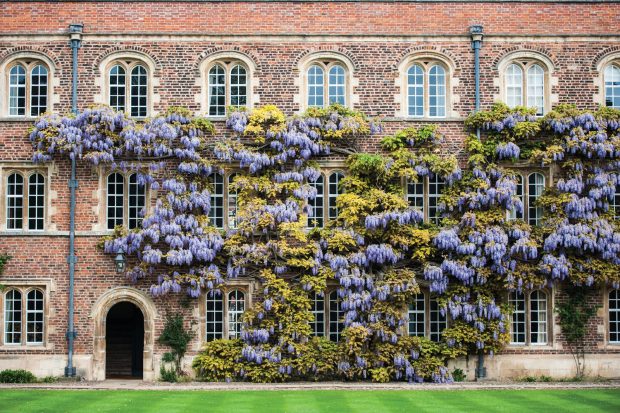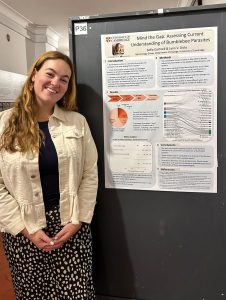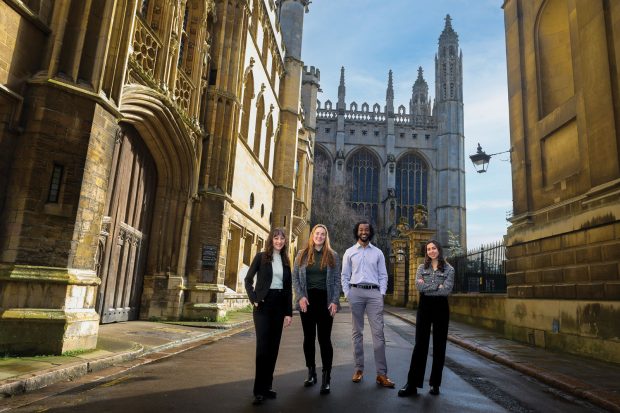
From left: Vera Berger ’23, Sofia Dartnell ’22, Mohammed Ahmed ’23 and Rya Jetha ’23. Photographed by Jean-Luc Benazet
Cambridge is waking up slowly on a crisp Sunday morning. The shadows of the scientists and other thinkers who have walked this ancient English university town seem to play across the cobblestone streets connecting the 31 colleges that call it home. Long before the apple dropped—or didn’t drop—on Isaac Newton’s head, his education in Cambridge prepared him to outline the foundations of modern physics. Alumnus Charles Darwin’s curiosity about a professor’s botanical work eventually bore fruit in the theory of evolution. And less than a mile away from where a group of Sagehens are getting their caffeine for the day is the Eagle Pub, where 71 years ago Francis Crick announced that he and James Watson had “discovered the secret of life”—the structure of DNA.
Moments of “Am I really here?” abound for four recent Pomona alumni pursuing graduate degrees at the University of Cambridge, all with full scholarships their small liberal arts college in California helped them land. Vera Berger ’23 is a Churchill Scholar, enrolled in a master of philosophy program in scientific computing before she starts a Ph.D. in physics at MIT in the coming year. “I had a pinch-me moment while attending a lunchtime astronomy talk on exoplanet atmospheres,” she says. “I stood in the back of the room by a professor who at the end of the talk asked a thought-provoking question. I looked over and realized he was the person who won the Nobel Prize for discovering the first exoplanet.”
‘A Museum Unto Itself’
“The city of Cambridge is a museum unto itself with so much fascinating history,” says Downing-Pomona Scholar Rya Jetha ’23, a master of philosophy student in world history. “I was astounded to learn when I first got here that one of the libraries at Cambridge—Trinity College’s Wren Library—has original manuscripts of Shakespeare’s plays, Isaac Newton’s annotated copy of the Principia Mathematica and the original texts of Winnie-the-Pooh.” Sitting in a library writing an essay about historian J. R. Seeley and his foundational work on the British empire’s spatiality, Jetha suddenly realized that he had been a Cambridge professor—“and right then I was sitting in the Seeley Library named after him!”
Some commonly used inventions have had odd beginnings within these walls. Sofia Dartnell ’22 is a Gates Cambridge Scholar and Ph.D. student in zoology at Darwin College whose research focuses on bumblebee conservation by studying their parasites. She learned from a professor in her department how the webcam that makes Zoom meetings possible had its origin near her lab. “It was originally built by caffeinated scientists who wanted to know whether there was coffee brewing in the building’s coffee pot before making their walk over,” she says. “The original coffee room in question is where I drink tea every morning.”
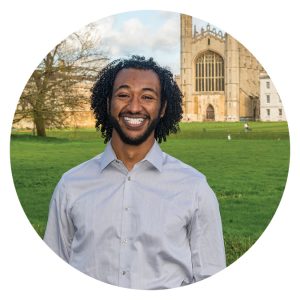
“When I think about me conducting scientific research at Cambridge, I remember the big names and am always shocked that I am here now in the same institution.” —Mohammed Ahmed ’23
Mohammed Ahmed ’23 remembers the moment he saw the email telling him he was, like Jetha, a Downing-Pomona Scholar. The award pays all expenses at Downing College for a year of master’s-level study in any discipline taught at Cambridge. Pomona graduates have been studying at Downing as part of the program for the past 30 years. “I was in shock,” Ahmed recalls. “I called my parents, then my brother, then friends. And finally just sat to take it in.” Though he’d never visited Cambridge, he says he “imagined it would be grand. I knew it was old and had history but did not know it was founded in 1209.”
Making Their Own Marks
Surrounded by eight centuries of history, the four Pomona alums are making their own marks in their chosen disciplines. Ahmed is researching neurodegenerative disease through the lens of physical chemistry. He describes his work as “probing the efficacy of computationally designed binders and naturally occurring chaperones on inhibiting Tau aggregation, and exploring the mechanisms by which these binders function.” It will, he hopes, “give insight into how we can therapeutically target misfolding diseases on the molecular level.”
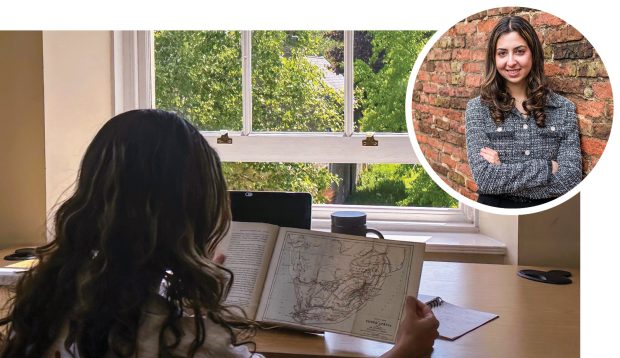
“I was astounded to learn when I first got here that one of the libraries at Cambridge—Trinity College’s Wren Library—has original manuscripts of Shakespeare’s plays, Isaac Newton’s annotated copy of the ‘Principia Mathematica’ and the original texts of ‘Winnie-the-Pooh.’” —Rya Jetha ’23
Jetha’s research on the Indian Ocean region, where she grew up, “continues to blow my mind,” she says. Jetha is part of a group of historians at Cambridge who are studying big, global processes from small places. “Islands as sites of intimate and intensive colonial encounter are undertheorized and understudied, so I’m working on a history of two small but powerful islands—Bombay and Zanzibar—during the 19th century,” Jetha says. The historic oceanic connections between these two islands have been neglected in favor of land-based nationalist histories, she says, adding that “there is so much to study beyond the limiting frame of the nation-state.”
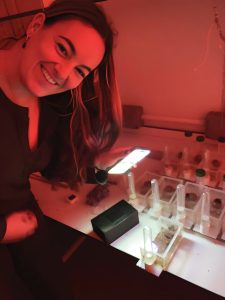
Sofia Dartnell ’22 raises bumblebees to use in her research. Wild queens are caught and provided pollen, nectar and a warm environment to encourage them to lay eggs. They are kept in the dark to mimic their natural nesting conditions underground, and checked in red light the bees can’t see.
When the cuckoo bumblebees are active in England’s warmer months, Dartnell can be found outdoors with her two-meter insect net catching queen bees to rear in the lab. Most of the time, the bees she studies live underground in a dark hole, unable to see each other. “The bees can recognize each other within the colony based on smell,” she notes. “I’m currently running choice experiments in the lab to figure out how accurate their sense of smell is.” So far, she’s found that it is spot-on. One wrinkle about the cuckoo bees—they are masters of disguise, a skill that has evolved since they cannot produce their own workers in their colonies. “They can pick up the scent profile of a colony they are invading and convince the worker bees to work for them using pheromones,” Dartnell explains. Cuckoos are an apex species that could be a “canary in a coal mine” for populations of pollinators facing threats of pesticides and habitat change. Ultimately, Dartnell hopes her research will help farmers modify their landscapes to support bee populations, which also could improve their crop yields.
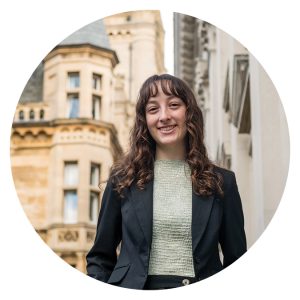
“Extending the residential college structure to postgraduate education has allowed me to build a strong community with postgrads across the academic spectrum.” —Vera Berger ’23
During her undergrad years at Pomona, Berger became fascinated with stellar flares and “how flares may contribute to the creation or destruction of life on other planets.” She developed a keen interest in learning how stars evolve and explode. In her Cambridge program, she is gaining computational skills useful “to model anything that can be thought of as fluid—liquids, plasmas and even solid materials that can squish or bend,” she says. After spending much of the year in coursework, she is excited to now be involved in a research lab exploring magnetic reconnection in plasma that produces these stellar flares. In future doctoral work, Berger says, she is “planning to study highly energetic astrophysical objects as probes of some of the most extreme physics in the universe.”
Opening Up Opportunities
The tradition of Pomona graduates winning scholarships to the renowned British university is well established, says Jason Jeffrey, assistant director of fellowships and career advising in the Career Development Office. In the past five years, three Pomona graduates have been offered Gates Cambridge Scholarships and three have been named Churchill Scholars. Through an agreement with Downing College, two Pomona alumni each year can study at the college in Cambridge and a Downing College student can enroll at Pomona.
“Our students are exceptional and well rounded, and many have studied abroad or have intercultural experience, so there’s no doubt about them being thriving members of the Cambridge community,” says Jeffrey. Students who pursue these scholarships “often have compelling reasons for studying in the U.K. It can be a vital steppingstone in their career.”
Each of the Sagehens attributes their current academic opportunities to encouragement from faculty, staff and friends at Pomona. During Dartnell’s freshman year, her advisor, Associate Professor of Biology Sara Olson, told her, “If you keep going like this, Sofia, you could apply for fellowships,” naming some of the major ones. “I know it’s early,” Olson said. “Just putting it on your radar.” The early encouragement paid dividends. Midway through her senior year, Dartnell got word that she had won a prestigious Gates Cambridge Scholarship. It covers all expenses for an entire Ph.D. program at the university, and recipients become lifetime members of an active and supportive community of scholars.
Jetha, who was raised in Mumbai, found her research direction as a freshman in a history class, Indian Ocean World, taught by Professor Arash Khazeni. The topic inspired her senior thesis as a history major, but she lacked access to important primary sources that were housed in the U.K. and not digitized.
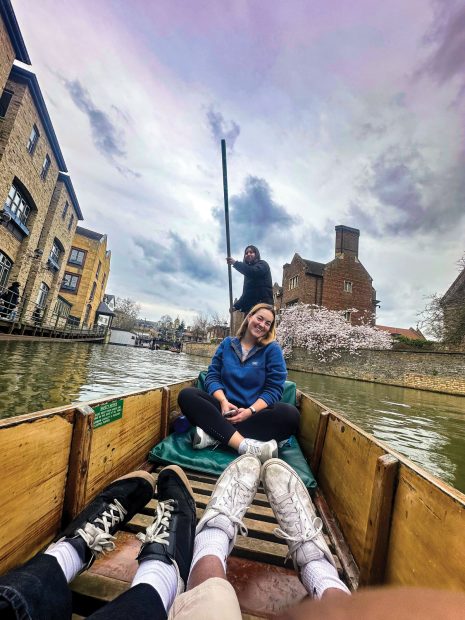
Punting on the River Cam is a quintessential Cambridge activity. Rya Jetha ’23 rows the punt with passenger Sofia Dartnell ’22.
“Professor Khazeni encouraged me to apply for the Downing Scholarship to continue my research in Cambridge,” she says. “I’d be a one-hour train ride away from a treasure trove of archives in London.” Since arriving in Cambridge, Jetha has become very familiar with the route to the British Library, where Charles Dickens, Karl Marx and Virginia Woolf also hung out. “Really, there’s nothing more exciting for a historian than spending the day looking at government records, letters, maps and other primary sources in the archives,” she says.
Beyond the Classroom
Just as they did at Pomona, the Sagehens are branching out far beyond academics. When Dartnell is not training and measuring the behavior of her cuckoo bumblebees—and yes, she’s heard all the jokes about studying cuckoos—she unwinds with trivia and salsa dancing in town. She also sings in a band with other Ph.D. students in Darwin College.
Both Ahmed and Jetha joined the Downing College rowing team and have spent scores of hours training and competing on the River Cam, which winds past colleges established by Edward II, Henry VIII and his grandmother, Lady Margaret Beaufort. “The most exciting experience was rowing camp in Banyoles, Spain, in January,” says Jetha. “The camp was physically exhausting—we rowed over 90 kilometers [56 miles] over the five days. But by the end we were all really good rowers and ready to conquer the Cam!” Ahmed also uses his arm strength to throw javelin for Cambridge athletics.
While she was at Pomona, Berger chose to focus her time outside of class on student government—she was president of the Associated Students of Pomona College her senior year and chair of the Judicial Council. Now, as a graduate student, she is trying new things. “I learned to operate the telescope that sits steps from Churchill College with the Cambridge Astronomical Society and joined the local roller derby team,” she says matter-of-factly, as if the combination doesn’t seem at all unusual.
Berger and her fellow alumni also are learning to slow down, and, of course, to drink tea. “In the astronomy department, they have tea breaks twice a day and everyone shows up,” says Berger. “A lot of times it turns into brainstorming, idea-bouncing time.” The same holds true in Dartnell’s area. “The Department of Zoology is situated in the same complex as the incredible David Attenborough Building, which is home to numerous conservation-based NGOs [non-governmental organizations],” she says. “Everyone in the department goes to 11 a.m. coffee, giving us the opportunity to connect and network with conservation leaders throughout the department and external organizations.”
Slowing down may seem surprising for high-achieving Sagehens in a historic university. In reality, though, it may be what helps them to successfully pursue their dreams while enjoying a balanced life. They find time for weekly chats at Bould Brothers Coffee in town or late-night scoops at Jack’s Gelato, a place in the city center that is so popular, the line frequently extends out the door. All four enjoy the renowned traditional Cambridge formal dinners the colleges host and where Berger says there is “eye-opening conversation” and Jetha adds that “people just sit and chat for the sake of it. You’re socializing and you’re not expected to do anything else. The setting is beautiful. That’s quintessentially Cambridge for me.”
‘Living English’
For Ahmed, Berger and Jetha, graduation this spring will wrap up their “year of living English.” They’ll move back to the right side of the sidewalk again—Ahmed was startled to discover that in the U.K. people not only drive on the left but also walk on that side as well. They’ll eventually return to calling a “flat” an “apartment,” throwing trash in a garbage “can” instead of a “bin” and driving cars that have “hoods” and “trunks” instead of “bonnets” and “boots.” A “jumper” will transform magically once again into a “sweater.” And perhaps not everything will be “dodgy” or “brilliant.”
Their paths will diverge as they build their futures. Ahmed plans to enroll in an M.D.-Ph.D. program and continue medical research to help patients overcome disease. Jetha, who worked on the staff of The Student Life newspaper during her college years, has accepted a position as a journalist in San Francisco. Berger is aiming for an academic career, hoping to teach in a liberal arts college after she completes her doctoral work.
Dartnell is settling in as she nears the halfway point of what she anticipates will be a four-year Ph.D. program. She’s excited to be generating research data and she is getting valuable experience leading weekly small-group discussion and debate sessions for clusters of undergraduates enrolled in conservation science courses. “I’m passionate about undergraduate teaching,” she says. “I hope to follow my passions for insect conservation and teaching to a career as a professor, ideally in an undergraduate-focused institution similar to Pomona.”
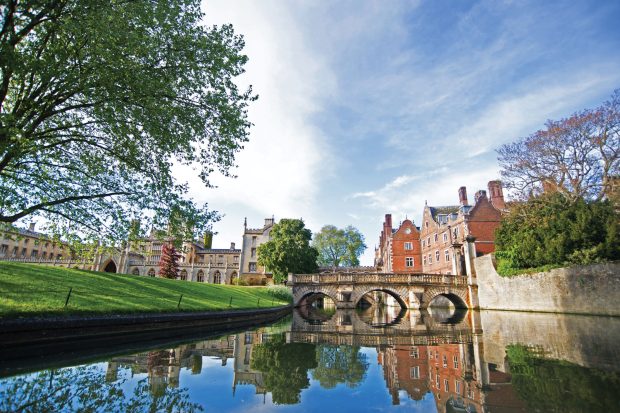
Kitchen Bridge, St. John’s College. Since the 13th century, the River Cam has provided an idyllic backdrop for learning at the University of Cambridge. Courtesy of Jean-Luc Benazet.
But for a little while longer, Cambridge life beckons. On this April morning, the dark of winter—when the sun sets as early as 3:46 in the afternoon—has given way to glorious blue skies. Dartnell sits on an outdoor bench near Regent Street, soaking up the sunshine and “getting some vitamin D.” For these four Sagehens in Cambridge, their Pomona experiences have set them up for success. Their futures, like the tulips and flowering trees around them, are beginning to bloom.

